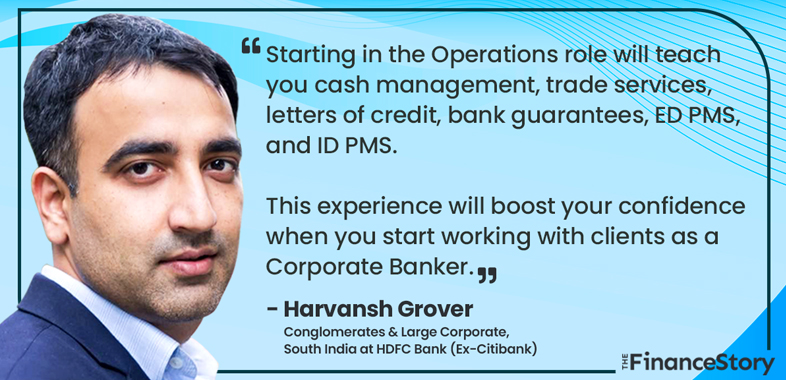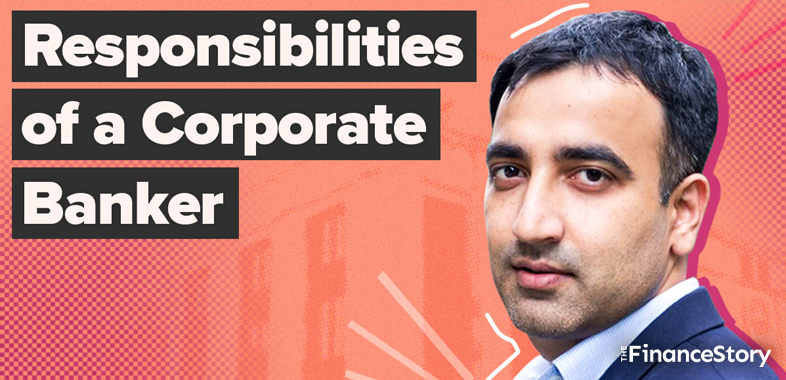With India’s growing economy, complex financial markets, and the rise of startups, the demand for Corporate Bankers in India is expected to rise.
Corporate Bankers need to juggle multiple roles effectively.
They facilitate various forms of financing, working capital, and advisory services that extend from equity fundraising via IPOs or private placements involving private equity.
To get a glimpse of the day-to-day responsibilities of the Corporate Banking role, we interviewed CA Harvansh Grover, Regional Head of Conglomerates & Large Corporate, South India at HDFC Bank.
1. Understanding Client Needs
The role of a corporate banker requires understanding the client’s business to offer fitting solutions. Thus, thorough industry research is crucial.
Reading about your client’s performance from the last quarter, analyzing financial statements, and asking questions to understand their challenges are part of the role.
“Since my clients belonged to diverse sectors such as consumer healthcare, technology, pharma, and automobile, I had to thoroughly prepare before meetings. That is one of the qualities of a successful Corporate Banker” says Harvansh.
2. Credit underwriting
A majority of a Corporate Banker’s tasks are spent underwriting credit. This can be working capital loans, term loans, project finance, or acquisition finance.
3. Advisory services
In addition to credit underwriting, they provide advisory services to their clients.
This can include M&A (mergers and acquisitions), equity fundraising, debt capital markets, and transaction banking.
Corporate Bankers also help clients with cash management and foreign exchange.
4. Creative Solutions
With over 140 banks in India and over 200,000 Corporate Bankers, you must stand out in drawing clients.
Understanding clients well and offering quick solutions to their needs can lead them to accept slightly higher fees for coupons or advisory services. Creativity within regulations is critical.
5. Building Relationships
Building client relationships is one of the most essential parts of the job.
This investment in time and effort is necessary to earn their trust. This trust allows clients to share financial information and helps you build your reputation over time.
If you spend 12 to 13 hours at work, you should dedicate half of that time to meeting clients.
6. Due Diligence
Avoid making a decision solely based on a good balance sheet.
For instance, dealing with multinational corporations overseas requires considering more than one factor like cross-border and industry risks. Otherwise, the repercussions can be unfortunate.
Skills required for a Corporate Banking role
Analytical Skills
As a Corporate Banker, you’ll have to analyze and present financial data clearly, sometimes using graphs and charts.
You may also have to make projections using simple Excel sheets and consider the bigger picture.
It’s easy to get lost in data, but your ability to extract meaningful insights matters.
Communication Skills
Both spoken and written communication skills are essential in a corporate banking role. You’ll need to talk with clients in person, over the phone, or through email.
“You don’t have to be the best communicator in the room but focus on improving your skill if it’s an area where you lack proficiency. Even I am still working on mine,” mentioned Harvansh.
Financial Skills
It is a no-brainer that Corporate bankers must understand financial statements.
Clients might expect you to know more about their balance sheets and business than they do. Basic knowledge of balance sheets, P&L, and financial ratios is crucial for entering corporate banking.
Numerical Skills
Being good with numbers is essential, but you don’t have to be extraordinary.
Commercial Awareness
Corporate Bankers benefit from spotting market trends, especially international ones.
Global market understanding will help you when working with various businesses. Networking is a plus in this field.
As a Corporate Banker, Harvansh frequently meets treasurers, CFOs, MDs, and CEOs from different industries, allowing him to learn from them.
Business Acumen
Corporate bankers need to grasp the business practices of the client. This helps them find suitable financial solutions more effectively.
For instance, a company needing a short-term loan while waiting for a payment requires a business-savvy banker’s advice.
Qualifications and Experience
Most Corporate Bankers hold a bachelor’s degree in finance, economics, or often an MBA.
Banking employers seek candidates who are open to travel and have flexible schedules.
Harvansh suggests spending a couple of years in an operations role. The hands-on experience that you will gain in this role will make you feel more confident facing clients as a Corporate Banker.

Closing…
The Indian banking sector is vibrant, however, the Banking services’ penetration in India is lower than in other markets, offering growth potential.
Investment from multinational companies is reflected in FDI Statistics. Retail banking has surged with UPI and digital banking, fostering opportunities in fintech.
The Corporate Banking sector in India is projected to grow by 15% in 2023, reaching a value of $1 trillion.
These prospects across sectors promise exciting careers in banking, especially as a Corporate Banker.







